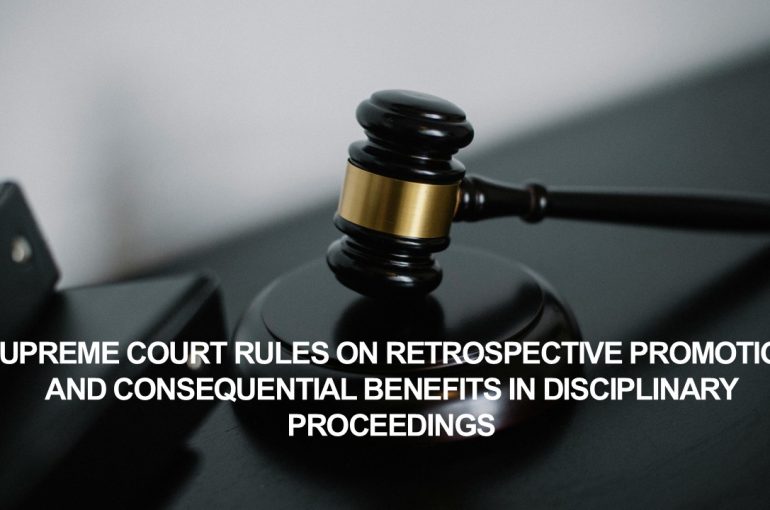SUPREME COURT RULES ON RETROSPECTIVE PROMOTION AND CONSEQUENTIAL BENEFITS IN DISCIPLINARY PROCEEDINGS
The Judgment in the Case of K. Samba Moorthy v. Sanjiv Chadha & Ors., Civil Appeal arising out of SLP (C) No. 10245 of 2024), was delivered by a Division Bench of the Supreme Court of India, comprising Hon’ble Justice B.R. Gavai and Justice K. V. Viswanathan, on January 27, 2025. This case concerns the Appellant’s claim for retrospective promotion and monetary benefits after disciplinary proceedings were set aside. It addresses whether the 2002 promotion cancellation can be revisited and if the Appellant is entitled to higher promotions due to the vitiated proceedings. The Court dismissed the Appeal, ruling the relief was not warranted as it wasn’t part of the original writ petition.
Brief Facts of the Case
The Appellant, K. Samba Moorthy, was appointed as a Probationary Officer in the Bank of Baroda in 1983 and was promoted to the Manager cadre (MMG-II) in 1992. While serving as a Branch Manager at Utran Branch, Gujarat, he was issued two Show Cause Notices in 1999 and 2000 for alleged lapses and irregularities. While he appeared for a promotion exercise from Scale-II to Scale-III in December 2000, a charge sheet in disciplinary proceedings was issued shortly thereafter. His promotion results, declared in July 2001, were kept in abeyance due to pending disciplinary proceedings. Following an inquiry into his role in opening savings accounts and sanctioning loans, a minor penalty was imposed on him in August 2001, reducing his pay by one stage for three years. His Appeals and review petitions were rejected.
In August 2002, he was informed that his promotion had been cancelled. He challenged the disciplinary orders in 2008 but did not contest the cancellation of his promotion. During the pendency of his writ petition, he was promoted in 2012 to Scale-III and later appeared unsuccessfully for promotions to Scale-IV in 2016, 2017, and 2018. In 2017, a Single Judge of the High Court ruled that the disciplinary proceedings were vitiated due to a likelihood of bias and set aside the penalty, granting consequential benefits. However, a Division Bench stayed this order, and the Appellant superannuated in 2018. In 2022, his representation for restoration of pay and promotion with monetary benefits was rejected, leading him to file a contempt petition, which was dismissed by the High Court on the ground that the necessary compliance had been made.
Issues Raised
- Whether the Appellant is entitled to retrospective promotion to Scale-III with effect from July 2001, along with consequential monetary benefits.
- Whether the setting aside of disciplinary proceedings entitled the Appellant to promotions up to Scale-V.
- Whether the cancellation of promotion in 2002, which was never challenged, could be reopened in the contempt petition.
- Whether the relief sought in the contempt petition could be granted when such relief was not adjudicated upon in the writ petition.
Contentions by both parties
Appellant’s Contentions
The Appellants contended that since the disciplinary proceedings were set aside, the Appellant should have been granted promotion from July 2001 along with all monetary benefits.
They argued that the cancellation of his promotion was directly linked to the disciplinary proceedings, which were found to be vitiated due to bias, thereby entitling him to retrospective promotion.
It was further submitted that his subsequent promotions and unsuccessful attempts at further promotions should not affect his entitlement to promotion from 2001.
The Appellants asserted that the bank was obligated to consider him for promotion as if no disciplinary action had taken place.
They also contended that the consequential benefits granted by the Single Judge’s order, including promotion and monetary benefits, were being unlawfully denied.
Additionally, they relied on precedents related to sealed cover promotions to support their claim for retrospective promotion and benefits.
Respondent’s Contentions
The Respondents asserted that the Appellant’s promotion was cancelled in 2002, long before he challenged the disciplinary proceedings in 2008, and at no point did he contest the cancellation of his promotion.
They contended that the consequential benefits ordered by the High Court were limited to salary restoration related to the minor penalty and did not include promotions.
It was further argued that since the Appellant was promoted in 2012 and later failed to clear further promotion exercises, his claims for higher promotions were baseless.
The Respondents also maintained that the Appellant’s case was distinguishable from those cited by him regarding sealed cover promotions.
Additionally, they contended that the contempt petition could not be used as a means to seek new reliefs that were not originally sought in the writ petition.
Supreme Court
The Supreme Court upheld the High Court’s decision dismissing the contempt petition. It observed that the Appellant had failed to challenge the cancellation of his promotion in 2002 and that the consequential benefits granted by the Single Judge did not include retrospective promotions. The Court held that the relief sought in the contempt petition could not be granted since the order of the Writ Court did not adjudicate on promotions. The Appellant had been granted all monetary benefits related to the minor penalty, and there was no basis for further claims. The Appeal was accordingly dismissed.
Conclusion
The Supreme Court found that the Appellant was not entitled to retrospective promotion or additional benefits beyond what was already granted. The cancellation of promotion in 2002 stood unchallenged, and the relief sought in the contempt petition was beyond the scope of the original writ order. Therefore, the contempt petition and Appeal were dismissed.
Baddam Parichaya Reddy
Associate
The Indian Lawyer & Allied Services
Please log on to our YouTube channel The Indian Lawyer Legal Tips and learn about different aspects of the law. Our latest video is on “Law on Ancestral Property” that may be viewed on the link below:





































Leave a Reply